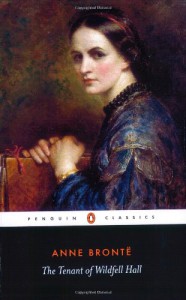The Tenant of Wildfell Hall, by Anne Bronte

Gah, why had I not heard of this book until only a few years ago? Why is it not read as widely as the books of Charlotte and Emily? It appears one explanation is that Charlotte prevented the novel's re-publication after her sister's death at 29. That's a shame because it was apparently successful when first published and is an early feminist novel.
Comparing this book with Wuthering Heights and Jane Eyre, it feels the darkest, with its then shocking portrayal of a bad marriage where the husband is an alcoholic and sleeps around. The central portion of the novel is brutal as Helen Huntingdon records the downward spiral of her life with Arthur Huntingdon. As a person of great faith, she does all she can to support him and withstand his profligate ways. Once she sees the influence he and his friends have on her young son (also Arthur), and after he continually abandons her to, essentially, party in London or wherever, and brings a lover to their home under the pretext of being a governess, she takes the unheard of step of leaving her husband and taking her son with her. Her brother, Frederick, helps establish her at the titular Wildfell Hall, though it's kept a secret that he's her brother, leading to rumors in the new town.
This book is very textual and layered structurally. Its frame takes the form of a letter from the narrator for most of the book, Gilbert Markham (who's an inhabitant of the new town to which Helen moves), to his friend and brother-in-law, Halford. He writes of the events leading to his present life in which he is married to the former Helen Huntingdon (though we don't know the outcome of events as readers). This means the whole story takes place in the past approaching the present, except for the few moments when Gilbert updates Halford on the fates of several other characters.
Eventually, Helen gives Gilbert her diary (with the end torn out) when their affection has grown and the latter has come to believe the rumors about her (that she and Mr. Lawrence--actually her brother--are carrying on). The diary shifts the point of view to Helen's and takes up a large central portion of the book, ending with her tenancy at Wildfell Hall just starting.
After the diary's conclusion, we're returned to Gilbert's pov, but later there are letters between Helen and her brother that we are privy to.
I like nested or embedded narratives, and the first two sections of the book read like a mystery as we wonder about Helen's behavior and then how exactly she came to Wildfell Hall. The latter portion of the story feels like a romance as Gilbert is left wondering if he has any hope with Helen now that her husband has died, and everything ends happily.
Speaking of the ending, I was somewhat surprised that it was so happy. For the most part, this is not a happy story. But the fact of Helen's faith is a huge source of optimism in the book. While at times it keeps her away from Gilbert, it sustains her and affects her attitude toward others; she believes in the possibility of salvation for everyone.
I wasn't too keen on Gilbert for much of the book, which is another reason I wasn't sure how I felt about the ending. He's kind of douche-y here and there, especially when he assaults Helen's brother (though he doesn't know that's who he is). But he makes fairly good in the end as he's hesitant to intrude upon Helen's new life or disturb her peace until he learns she still loves him and want to marry him.
This book made me understand why the future Temperance Movement was a woman's issue as we see the effects alcoholism has on wives and families during a time when divorce was unlikely and women were at a disadvantage status-wise. It also made me lament anew the fact of marriage as a certainty for women or else.
 1
1










